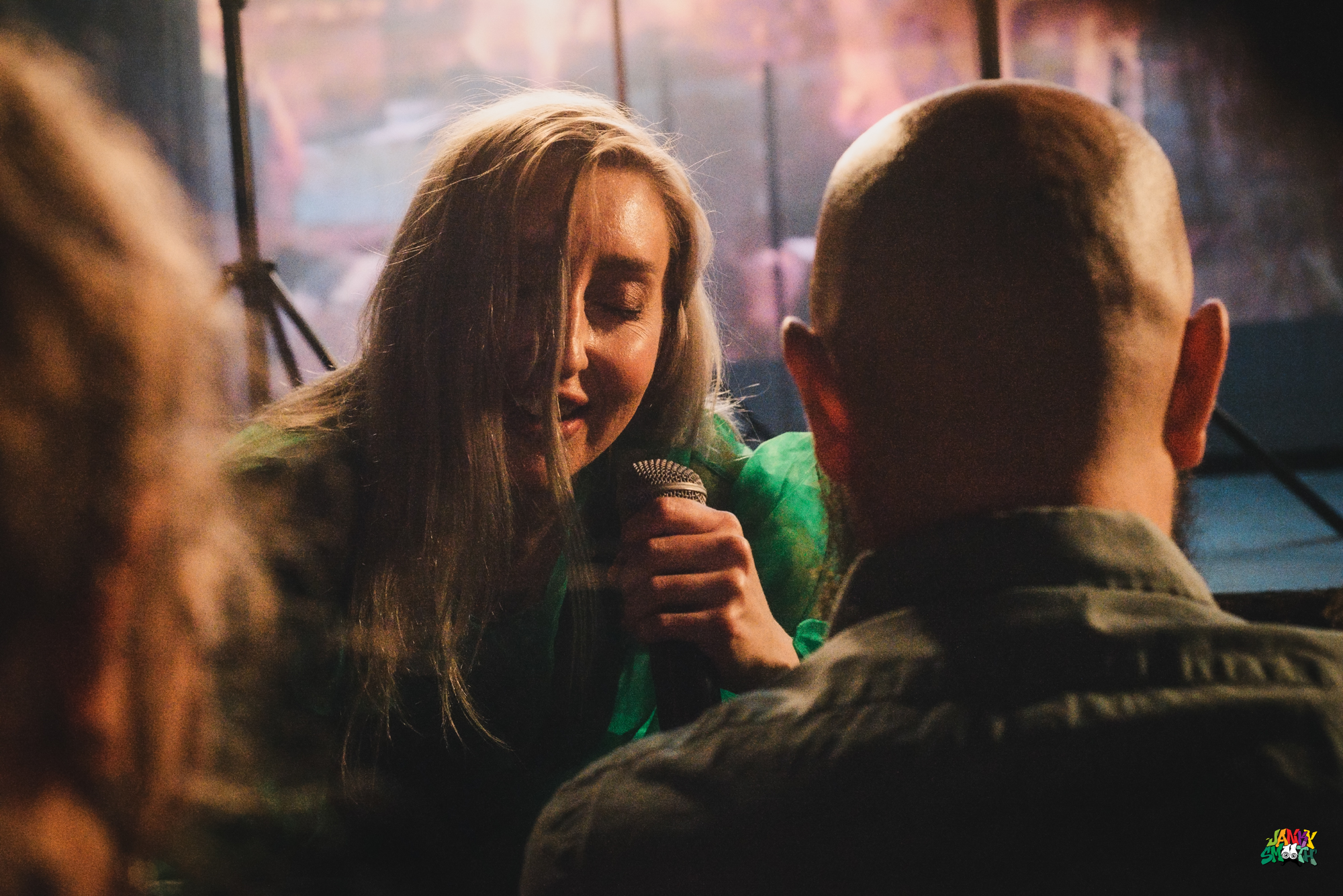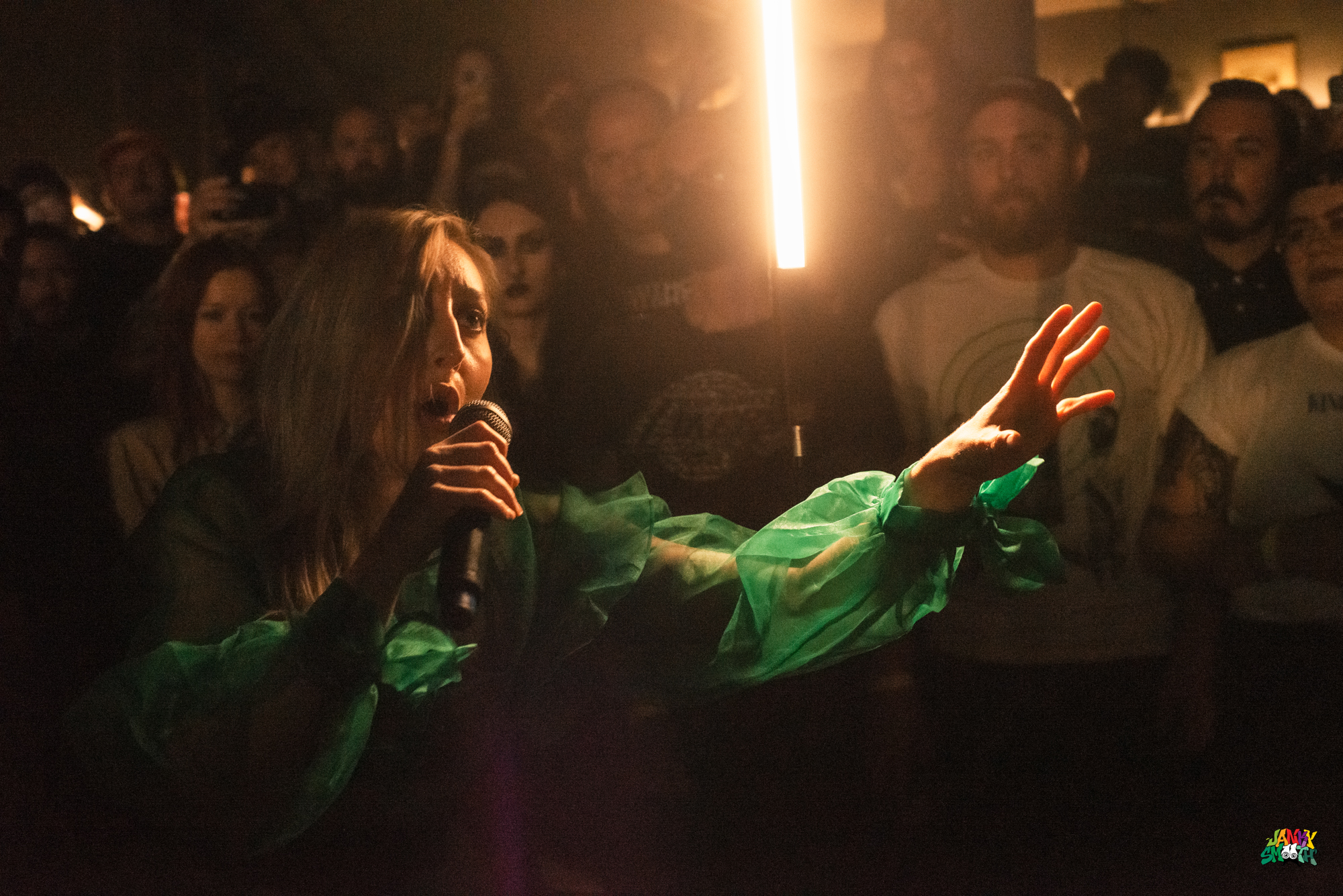
Lingua Ignota
Participating in church is a form of mass formation. A sort of collective insanity, reaching a fever pitch with the right pied piper at the pulpit, leading their congregation through a wild purging of trauma and fear through sermon, song or speaking in tongues until catatonic tremors. It’s a necessary escape from sanity. Many of the people that attended Lingua Ignota have left their churches or been shunned by them but found a home among outcasts that feel Lingua Ignota’s music makes them feel like they’re in the graces of God but not under the eyes of his judgement. These people may not have an organized religion anymore but they still need spiritual guidance and leadership. Lingua Ignota fills that void. Her style of music represents a new, secular religion, scary to some, but by tapping into holy notes and chambers of her vocal cords, she is able to produce that same elusive, overwhelming and rapturous feeling of being in the presence of the sacred. Humans need myth and metaphor, which she conjures in songs like “MAN IS LIKE A SPRING FLOWER” as well as the knowledge of their acceptance, eluded to in songs like “FAITHFUL SERVANT FRIEND OF CHRIST”. New interpretations of old forms of religion appear frightening to orthodoxies only at first, in time the fear fades away because in the end, it only brings people closer to spiritual truth which contains the same basic ethics. Even the most religious people ought to admit, it’s better for the world that people find acceptance and community in secular music to ease their pain than suffering alone without a church.





Opening for Lingua Ignota on these select and sacred dates was Ioanna Gika, another siren songstress with holy energy, only she likes to play more danceable and disruptive music to deliver her art. Like Lingua Ignota, Ioanna Gika taps into old music forms that thrived long before rock and roll then puts a new spin on them. In Ioanna’s case, her beats give her an almost industrial or dark wave edge, sometimes even delving into dubstep, that could play at a goth club or rave.
Like religion, the lyrics of Lingua Ignota are esoteric, constructing new metaphors for an old world, as if she was writing the story herself, from the lens of a modern woman, from Genesis to Deuteronomy, to Revelation and beyond. Like most biblical prophets, Lingua has led a life of turbulence from which she derives her deep insight. It’s an old testament teaching that those who know the darkness are capable of producing more light than those who have only ever known the light. Lingua Ignota represents redemption in this sense, and everyone seeking it flocks under the wings of her beautiful, soaring voice. That’s not to say this audience is most likely living in sin, but if you were to really take a microscope to most of our lives, I would bet most of us have some weight we are carrying and want to confess and repent for.




Trying to isolate the exact reason why people love her music, I think it has most to do with the amount of emotion she is willing to bare before an audience. She gives so much of herself that it must take a toll to bring your mind and spirit to the psychological places she’s singing from. In the song, “DO YOU DOUBT ME TRAITOR”, she repeats the lyrics “I don’t eat, I don’t sleep” over and over, transporting the audience to some of their most painful moments when they were so in love or depressed that it brought them total misery. She isn’t embarrassed to share her most pained and vulnerable memories and by doing so, people feel vindicated knowing they’ve been there too.
This Regent performance was her last in Los Angeles since Zebulon many years ago after the release of CALIGULA. Now, a year after SINNER GET READY, she returned to a sold out crowd to do what she does best and use her voice to penetrate even the most powerful emotional defenses. The story in her music is that of her own life but also the life of the world, and the life of God, all converging where the personal and celestial find common ground, and it’s usually in those moments that a person feels most alone and terrible and needing God. It’s moments like these that drive people to religion in the first place. For all religion’s shortcomings, I don’t think music like Lingua Ignota’s signals the end of organized religion as we know it but the need for it instead. Speaking to people outside after the show, the question I asked most was straight forwardly, “Do you believe in God?” most people I encountered said yes. I imagine that God helped them survive the moments that made Lingua Ignota’s music so relatable to them.








On the surface, the thesis of SINNER GET READY is to address her audience as sinners in order to make a statement about Abrahamic religion and how these sects judge people for merely following their truth. Deeper than the surface though, Lingua Ignota poses herself in this album as a sort of Christ figure herself, sacrificing herself so far as to even go to hell with her congregation, simply so that they don’t feel alone in their sinning. She poses the listener with the simple question: “Do you want to be in hell with me?” And even if they say no, she assures them that “But one thing I’ve learned that everything burns.” So even just living on Earth, there’s so much torture, might as well live your truth if it brings you happiness.
Words by: Robert Shepyer
Photos by: Michelle Corvnio






